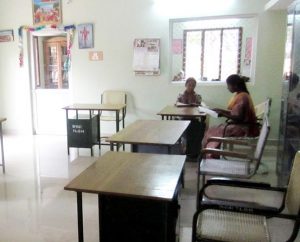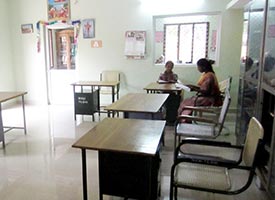By Melanie Ave
Three Lutheran schools in India now have new restrooms, computers, study rooms and roofs, thanks to a new LCMS nonprofit with the purpose of funding projects in the country — the Synod’s first foreign mission field.

The India Lutheran Development and Relief Agency (ILDRA) — an independent ministry to which the LCMS has provided grant money to further its work in India —awarded $98,374 in grants in December 2012 to the three Lutheran schools associated with the India Evangelical Lutheran Church (IELC), an LCMS partner church.
All three school projects were completed this year.
“This is a huge accomplishment, a huge step forward in capacity for us and these brothers and sisters in India,” said Darin Storkson, the LCMS regional director for Southern Asia and Oceania. “
The grant specifications required the schools to have headmasters in good standing in the IELC, to offer at least one class on Lutheran theology and to have a mission compatible with the statement: “motivated by Christ and His Gospel, according to the Lutheran confession of the faith.”
The completed school projects were:
- a $40,800 grant to the Concordia Higher Secondary School in Vaniyambadi which provided new toilets and a computer training center at the school where 1,700 students attend.
- a $24,240 grant to the Missouri Evangelical Lutheran India Mission (MELIM) School at Kolar Gold Fields, to provide 50 benches and desks, 10 computers, an audio system, roof renovation and toilets.
- a $33,334 grant to the Thabithal Lutheran Girls Boarding Home in Ambur, to fund roof repairs, a new storage room and a new study room at the 80-year-old school.
The Concordia Higher Secondary School focuses on educating poor children who live in or near Vaniyambadi. Many of the students’ families are illiterate.
According to the school’s headmaster, Daniel Godwin Raja Kumar, the school did not have enough computers for its older students and its bathrooms were severely lacking. Oftentimes, adolescent girls stop attending schools, due to a lack of toilets.
“We are very happy to see the new toilet facilities and the renovated computer lab,” Kumar wrote in an email. “The students [have already started] using the renovated computer lab this academic year. They are very eagerly waiting to use the new toilets. We told them that these helps are possible only through the generous gifts from the LCMS.”
The MELIM School is more than 80 years old and was in need of numerous repairs, according to P. Edwin Nesaraj, project director.
“We thank our Lord for bringing this great help from the LCMS,” Nesaraj wrote in an email. “This project helped us in improving the MELIM school image in the society.
“Many outsiders and old students of the school appreciated the efforts to renew the school structure and [get] a computer lab. The children are very happy to use the new toilets built for them with the help of the LCMS funding. We are hoping to get more admissions in the school this year.”
The need for renovations also was great at the Thabithal Lutheran Girls Home, which is more than 80 years old and has about 350 students. The school was operating in “very old buildings,” according to Preetha Premraj, the project director. The roof needed repairs, and the school needed space for the students to keep their belongings and a room to study.
The threat of a government shutdown of the school was possible because of poor conditions.
“The children are very happy to use the new facility,” Premraj said in an email. “They are encouraged to study more and have very spacious places to store their belongings. We tell them and the parents that this help comes from the donors who love Jesus and have compassion for the poor and the needy.”
“The people of this church body remain incredibly faithful and incredibly loyal to us,” Storkson said. “Many are doing wonderful work that we want to support.
“We have a lot of toilets that need to be built. That sounds like such a mundane thing but can you imagine a school with hundreds of students but no toilets? That’s the situation they’re in there.”
Storkson estimated it would take at least $2.5 million to repair the IELC’s 89 schools, since many of them have had few, if any, improvements since they were established by missionaries years ago.
LCMS missionaries were first sent to India in 1895. In the years following, the LCMS continued to send hundreds of missionaries to India. Finally, in 1958, the IELC became an independent church body and the first LCMS partner church.
Storkson said the IELC still considers the LCMS its “mother” church and that some of the IELC’s administrative problems can be attributed to growing pains.
The LCMS has no active missionaries in India now, but Storkson said the IELC has asked the Synod to send theological educators.
“These are our brothers and sisters of our first daughter church,” Storkson said. “There are many, many wonderful pastors, congregations and members there that are doing wonderful work but, of course, have limited resources. They need and frankly, expect, our support as their ‘mother’ church.
Another round of projects has already been approved by the ILDRA, Storkson said. But the organization must first receive a government permit that is required for foreign contributions. The grants will pay for improvements to two churches and one school and also assist with a cows-for-widows program.
Storkson said that as soon as the Indian government approves the permit, the ILDRA will begin a regular process of approving grants to churches and schools in need of help with capital improvements and human-care projects.
To learn more about the Synod’s work in India, visit lcms.org/india.
Melanie Ave is senior writer and social media coordinator with LCMS Communications.
Updated Nov. 18, 2013 / Sept. 16, 2014
